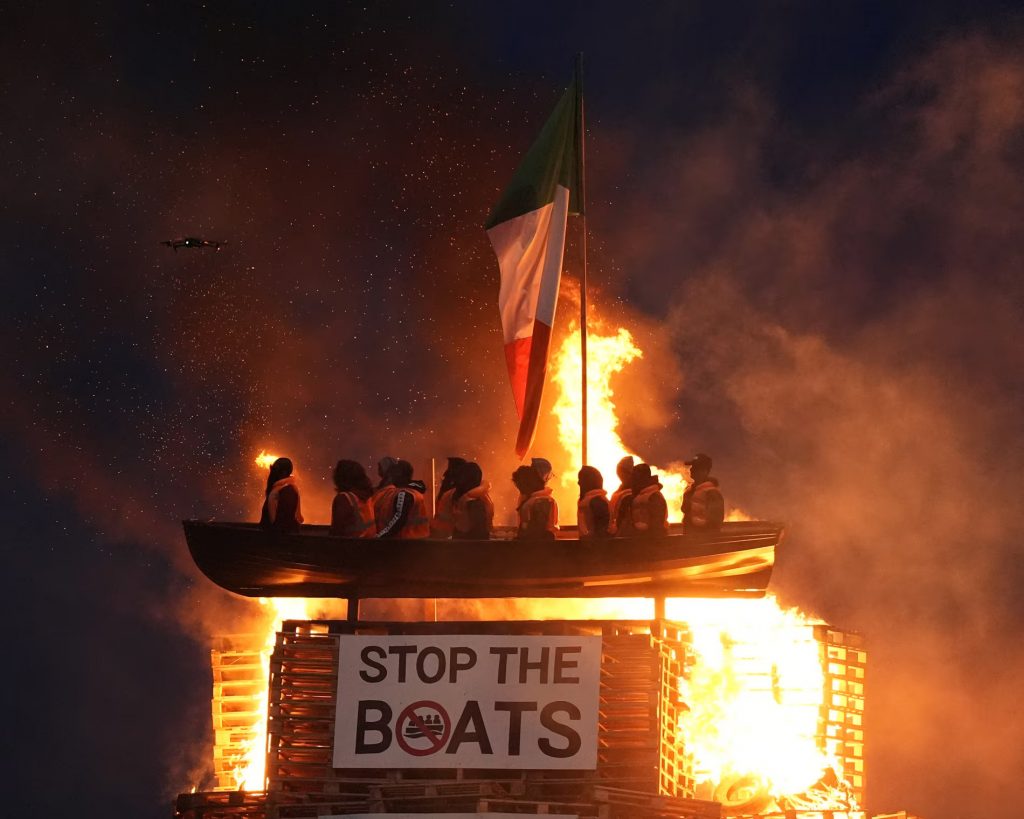Police in Northern Ireland are looking into a shocking incident where refugee figures were burned during a loyalist bonfire event. The fire took place on Thursday night in the village of Moygashel, County Tyrone. Crowds were seen cheering as flames destroyed a model boat filled with lifesize mannequins of dark-skinned people wearing life jackets.
The effigies were made to look like refugees. Signs placed beneath the boat read “stop the boats” and “veterans before refugees.” An Ireland flag was also thrown into the fire. The bonfire was part of a wider cultural event linked to loyalist traditions.
Police said earlier that day they were investigating the display as a hate incident. Many political leaders and human rights groups had already called for the mannequins to be removed. They said the act was racist, offensive, and dangerous.
What message does this send to migrants in Northern Ireland?
Many feel the burning of these refugee models sends a terrifying message to migrant families. Amnesty International said it was a shame that the event was allowed to happen. Their Northern Ireland director said it shows growing hostility, especially after other recent attacks on migrants, including homes being set on fire.
Sinn Féin politician Colm Gildernew described the effigies as disgusting and an attempt to treat people like they are not human. He praised the police for calling it a hate crime and asked that those responsible be held accountable. Ulster Unionist leader Mike Nesbitt also condemned the act, calling it “sickening” and saying it has no place in a cultural celebration.
Meanwhile, another bonfire in Belfast has sparked safety concerns. It is built near an electricity substation that powers two major hospitals and is located on land that contains dangerous asbestos. The environment minister, Andrew Muir, asked people not to attend the event for their own safety.
Despite these concerns, some loyalist activists defended the Moygashel bonfire. One known figure, Jamie Bryson, said it was a form of “artistic protest” aimed at raising awareness about illegal immigration. He claimed the display was a tradition and part of the community’s cultural expression.
The bonfires are part of the annual celebrations marking the 1690 victory of King William III, a Protestant king, over Catholic forces. Large parades are expected to take place across Northern Ireland on Saturday as part of these celebrations.
In Belfast, city council members voted to take down another controversial bonfire on Meridi Street. However, the fire is still expected to go ahead, as police said stopping it could lead to more violence. Paramilitary groups had warned of unrest if the structure was removed. Sinn Féin argued that letting the fire proceed would mean giving in to threats and mob pressure.
As tensions rise across the region, many are calling for peaceful celebrations and respect for all communities, including migrants who live in fear of being targeted.

